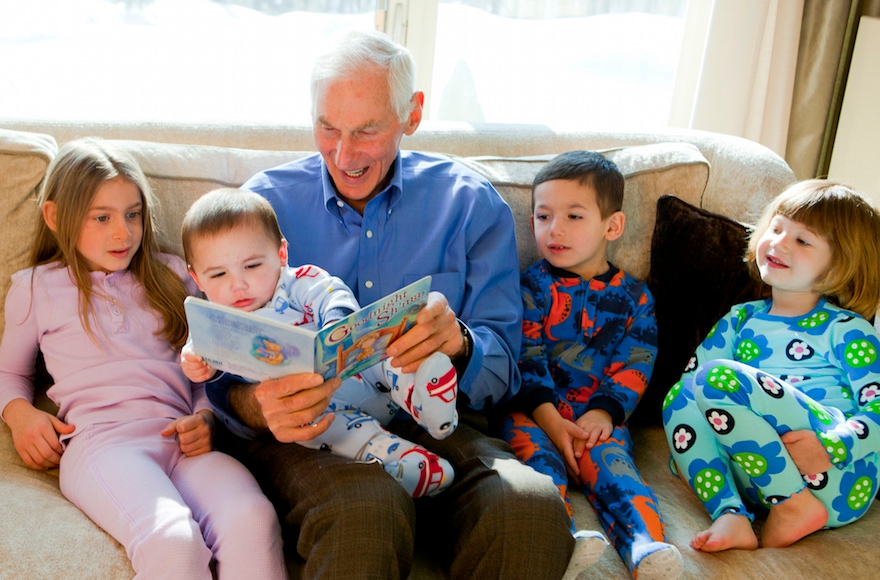NEW YORK (JTA) — Families that receive free Jewish children’s books from the Massachusetts-based PJ Library say the program has helped them feel more connected to their Jewish communities, with interfaith families especially saying it has spurred them to celebrate Jewish holidays and Shabbat and to learn more about Judaism, a new study found.
The study, released Tuesday by PJ Library and the Harold Grinspoon Foundation, found that 69 percent of participating families say the program has helped them feel more connected to their Jewish communities, whether by attending programs run by PJ library itself or activities run by local Jewish institutions.
Respondents also say the program helps them feel “more knowledgeable and confident” about how to engage in Jewish traditions with their children (83 percent), and 91 percent say the program is a valuable parenting tool.
More than half of intermarried couples who subscribe said the program influences their family to celebrate Shabbat, and 64 percent said it influences them to observe Jewish holidays. Nearly 90 percent of intermarried respondents said the books helped them learn more about Judaism, according to the triennial survey.
More than 25,000 users responded to the survey, which was conducted with the external evaluation firm Informing Change.
The program, launched in 2005 by the Grinspoon Foundation, now sends one book a month and occasional music CDs to 170,000 children ages 6 months to 8 years among 125,000 families in the United States and Canada. A parallel program, Sifriyat Pijama, operates in Israel. PJ Library estimates that its books are read 6.5 million times a year. Local Jewish federations and other institutions partner with the foundation in covering costs.
The findings confirm the goals of the program’s founders, who hoped that bringing parents and children together over Jewish-themed books would not just be worthwhile in its own right, but inspire them to connect with other Jewish programs and institutions.
“We take seriously that each night parents are inviting us to join their family during one of the day’s most treasured moments before bedtime,” Winnie Sandler Grinspoon, president of the Harold Grinspoon Foundation, said in a statement. “Parents have told us that the PJ Library books their families receive each month not only help them feel more capable of raising Jewish children, but also make them more excited to pass on the traditions and beliefs they cherished in their own childhoods or have come to cherish as adults.”
The survey also found that subscribers’ had relatively high Jewish involvement. While the 2013 Pew Research Center’s study of American Jews found that 30 percent do not affiliate with a denomination, the number was only 10 percent for PJ Library subscribers.
And while the Pew study found that the intermarriage rate since 2000 is 58 percent, it’s less than half that, 28 percent, among PJ Library subscribers.
The study’s authors said they were not surprised that PJ Library families are more likely than the general population to be affiliated with Jewish organizations, since families usually hear about the program through synagogues, federations or Jewish community centers.
Among subscribers, satisfaction rates are high. Nearly two-thirds of subscribers, according to the study, read the books at least weekly, and 95 percent read them at least once a month. Virtually all respondents — 99 percent — said they have been “influenced or supported by PJ Library.” A majority of families responded that the books made them more likely to use a charity box or to increase their Jewish involvement in some other way, and 83 percent said it helps them feel more knowledgeable and confident about how to engage in Jewish traditions with their children .
“Books are a natural way to invite people into a global community and to pass values and traditions onto the next generation, ensuring our children and their children grow up connected to their Jewish heritage,” said Harold Grinspoon, a real estate developer in western Massachusetts and the founder of PJ Library.
Responses to the study, which was funded by the Harold Grinspoon Foundation, were gathered between November 2016 and January 2017. The study had a 1 percent margin of error.
JTA has documented Jewish history in real-time for over a century. Keep our journalism strong by joining us in supporting independent, award-winning reporting.






